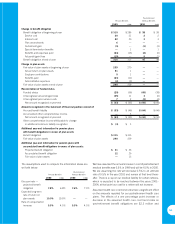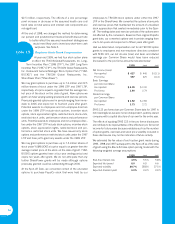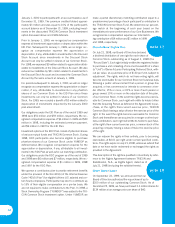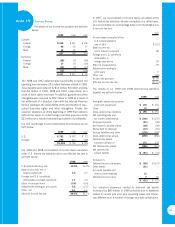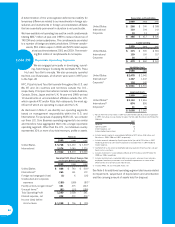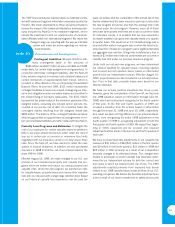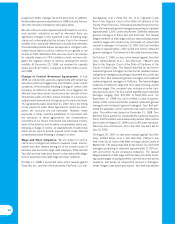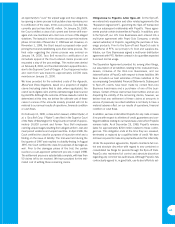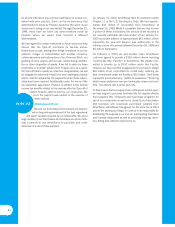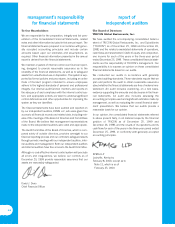Pizza Hut 1999 Annual Report Download - page 65
Download and view the complete annual report
Please find page 65 of the 1999 Pizza Hut annual report below. You can navigate through the pages in the report by either clicking on the pages listed below, or by using the keyword search tool below to find specific information within the annual report.
63
an opportunity to “cure” the unpaid wage and hour allegations
by opening a claims process to all putative class members prior
to certification of the class. In this cure process, Taco Bell has
currently paid out less than $1 million. On January 26, 1999,
the Court certified a class of all current and former shift man-
agers and crew members who claim one or more of the alleged
violations. The lawsuit is in the discovery and pre-trial motions
phase. A trial date of November 2, 1999 was set. However, on
November 1, 1999, the Court issued a proposed order post-
poning the trial and establishing a pre-trial claims process. The
final order regarding the claims process was entered on
January 14, 2000. Taco Bell moved for certification of an
immediate appeal of the Court-ordered claims process and
requested a stay of the proceedings. This motion was denied
on February 8, 2000, and Taco Bell intends to appeal this deci-
sion to the Supreme Court of Oregon. A Court-approved notice
and claim form was mailed to approximately 14,500 class
members on January 31, 2000.
We have provided for the estimated costs of the Aguardo,
Mynaf and Bravo litigations, based on a projection of eligible
claims (including claims filed to date, where applicable), the
cost of each eligible claim and the estimated legal fees incurred
by plaintiffs. Although the outcome of these lawsuits cannot be
determined at this time, we believe the ultimate cost of these
cases in excess of the amounts already provided will not be
material to our annual results of operations, financial condition
or cash flows.
On February 10, 1995, a class action lawsuit, entitled Ryder, et
al. v. Taco Bell Corp. (“Ryder”), was filed in the Superior Court
of the State of Washington for King County on behalf of approx-
imately 16,000 current and former Taco Bell employees
claiming unpaid wages resulting from alleged uniform, rest and
meal period violations and unpaid overtime. In April 1996, the
Court certified the class for purposes of injunctive relief and a
finding on the issue of liability. The trial was held during the
first quarter of 1997 and resulted in a liability finding. In August
1997, the Court certified the class for purposes of damages as
well. Prior to the damages phase of the trial, the parties
reached a court-approved settlement process in April 1998.
The settlement process is substantially complete, with less than
50 claims left to be resolved. We have provided for the esti-
mated cost of settling these remaining claims.
Obligations to PepsiCo After Spin-off. At the Spin-off,
we entered into separation and other related agreements (the
“Separation Agreement”), governing the Spin-off transaction
and our subsequent relationship with PepsiCo. These agree-
ments provide certain indemnities to PepsiCo. In addition, prior
to the Spin-off, our U.S. Core Businesses each entered into a
multi-year agreement with Pepsi-Cola Company, a wholly
owned subsidiary of PepsiCo, regarding the purchase of bev-
erage products. Prior to the Spin-off and PepsiCo’s sale to
AmeriServe of PFS, our primary U.S. food and supplies dis-
tributor, our Core Businesses signed a multi-year distribution
agreement with PFS. Neither contract is for quantities expected
to exceed normal usage.
The Separation Agreement provided for, among other things,
our assumption of all liabilities relating to the restaurant busi-
nesses, inclusive of the Non-core Businesses, and our
indemnification of PepsiCo with respect to these liabilities. We
have included our best estimates of these liabilities in the
accompanying Consolidated Financial Statements. Subsequent
to Spin-off, claims have been made by certain Non-core
Business franchisees and a purchaser of one of the busi-
nesses. Certain of these claims have been settled, and we are
disputing the validity of the remaining claims; however, we
believe that any settlement of these claims at amounts in
excess of previously recorded liabilities is not likely to have a
material adverse effect on our results of operations, financial
condition or cash flows.
In addition, we have indemnified PepsiCo for any costs or losses
it incurs with respect to all letters of credit, guarantees and con-
tingent liabilities relating to our businesses under which PepsiCo
remains liable. As of December 25, 1999, PepsiCo remains
liable for approximately $200 million related to these contin-
gencies. This obligation ends at the time they are released,
terminated or replaced by a qualified letter of credit. We have
not been required to make any payments under this indemnity.
Under the separation agreements, PepsiCo maintains full con-
trol and absolute discretion with regard to any combined or
consolidated tax filings for periods through the Spin-off Date.
PepsiCo also maintains full control and absolute discretion
regarding any common tax audit issues. Although PepsiCo has
contractually agreed to, in good faith, use its best efforts to set-




